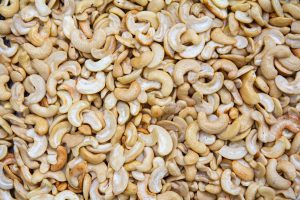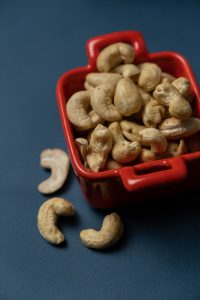
Cashew Nuts are a healthy and delicious variety of dry fruits that has become increasingly popular in recent years. Native to tropical regions of Africa, Asia and India, cashew nuts are packed with protein, fiber, vitamins and minerals, making them a great addition to any diet. Cashew Nuts are incredibly versatile and can be used in a variety of dishes, from savory curries to sweet desserts.
Nutritional Benefits of Cashews
Cashew nuts are an excellent source of magnesium, which plays a key role in energy production and helps to regulate blood sugar levels. Magnesium helps to strengthen bones, reduce inflammation and improve nerve and muscle function. Cashews are also high in copper, which helps to improve iron absorption and maintain healthy red blood cells. Copper is essential for healthy bones, skin, hair, and eyes.
Cashews are also a good source of protein, with one ounce providing 5.2 grams of protein. Protein is essential for building and maintaining muscles and tissues. Cashews are also rich in dietary fiber, which helps to keep the digestive system running smoothly. Eating a diet with adequate dietary fiber can help to reduce the risk of developing certain chronic diseases, such as heart disease and diabetes.
In addition to the essential nutrients, cashew nuts are a source of healthy fats. These include both monounsaturated and polyunsaturated fats, which can help to lower cholesterol levels. Eating foods that contain healthy fats can help to reduce the risk of developing heart disease.
Cashews are also a good source of antioxidants, which can help to protect the body from damage caused by free radicals. Free radicals are unstable molecules that can damage cells and lead to the development of chronic diseases. Antioxidants neutralize free radicals, protecting cells from damage.
Cashews are also rich in minerals such as zinc, which can help to boost the immune system and protect against infections. Zinc also helps to heal wounds and speed up the healing process. Cashews are also a good source of iron, which is essential for producing red blood cells and delivering oxygen around the body.
Cashews are a great snack choice, as they are low in calories and full of essential nutrients and minerals. Eating a handful of cashews per day can provide a range of health benefits, including improved energy levels, better digestion and a stronger immune system. Cashews are also naturally free from cholesterol, so they can be enjoyed as part of a healthy diet.
History of Cashews
The cashew tree, Anacardium occidentale, is native to the tropical regions of Brazil, but the nut itself can be found in many countries today. The word “cashew” comes from the Portuguese word “caju”, which is derived from the Tupi-Guarani language of South America. The cashew tree is related to the mango, pistachio, and poison ivy, and it produces many different edible products.
Historically, the cashew is thought to have originated in Brazil, where archeologists have found evidence of the nuts being consumed as far back as the 16th century. In the 17th century, Portuguese explorers introduced the cashew tree to India, where it quickly spread. By the late 19th century, cashew plantations had been established in many parts of Asia, the Caribbean, and Africa.
In the United States, the first commercial cultivation of cashews occurred in Florida in the 1920s. The cashew industry grew rapidly in the United States, and by the 1940s, cashew processing facilities were operating in California, Texas, New York, and Massachusetts. During World War II, the United States supplied cashews to its allies, as well as to its own troops. After the war, some of the cashew processing plants were transferred to Central America, where the climate was better suited for cashew cultivation.
The cashew nut is made up of two edible parts: the nut and the seed. The nut is encased in a hard shell and the seed is the edible part. The seed is rich in proteins and fatty acids, and it also contains a variety of vitamins and minerals. The nut is a popular snack food and is often consumed roasted, salted, flavored, or as part of a trail mix.
The cashew tree is also used for its oil and for its wood. The oil is extracted from the pulp of the fruit and is used in cooking, cosmetics, and medicines. The wood of the tree is hard and durable, and it is used to make furniture, carvings, and musical instruments.
Cashew nuts are also a major source of income for many countries. In India, the cashew industry employs millions of people and accounts for over 8 % of the country’s agricultural exports. In Brazil, the Cashew Export Promotion Council of India (CEPCI) promotes and helps to export cashews to over 75 countries.
Today, cashew consumption is growing all over the world. The nut is a popular snack and is used in a variety of recipes including desserts, salads, and curries.

Cooking with Cashew Nuts
Cooking cashew nuts is a great way to add flavor to a variety of dishes. Whether you’re looking for a snack, an entrée, or a side dish, cashew nuts can provide a delicious and nutritious boost. From roasting to baking, there are many different ways to prepare and cook cashew nuts – each with its own unique flavor and texture.
Roasting is one of the most popular methods of cooking cashew nuts. When roasting, you can use a range of temperatures and times, depending on the desired outcome. If you’d like to bring out the cashew nut’s natural sweetness, try roasting at 350°F for 10-15 minutes. For a more savory flavor, increase the temperature to 375°F and roast for 15-20 minutes. The key to successful roasting is to stir the cashews often to ensure they are cooked evenly.
Another popular method of cooking cashew nuts is baking. Baking allows you to bring out the nutty flavor of the cashew and make them a little crunchier. Start by preheating the oven to 350°F and spread the cashew nuts on a baking sheet. Bake for 8-10 minutes, stirring the nuts halfway through to ensure they are cooked evenly.
If you’d like to add a bit of spice to your cashew nuts, try pan-frying them. Heat up a skillet over medium heat and add enough oil for a light coating. Add the cashew nuts and stir constantly until they are golden brown. This method of cooking cashew nuts allows you to get a nice crunchy exterior with a soft interior.
When looking to add a sweet touch to your cashews, try toasting them. Start by melting some butter in a skillet and then add the cashew nuts. Toast the nuts over medium heat until they reach a golden brown color and begin to smell nutty.
No matter how your cook your cashew nuts, the key is to not overdo it. Overcooking can make the cashews tough and even a little bitter. Also, be sure not to add too much oil or butter when cooking or they will become greasy.
Clinical Trials on Cashews
In recent years, cashew nuts have become increasingly popular as a health food. Research has shown that they may have a variety of potential health benefits, including reduced risk of heart disease and improved cholesterol levels. But are these benefits backed up by clinical trials?
The answer is yes. A number of clinical trials have been conducted on the potential health benefits of cashew nuts. In one trial, a group of 35 volunteers was given 30 grams of cashew nuts per day for four weeks. At the end of the trial period, it was found that the volunteers had significantly lower levels of total cholesterol, LDL cholesterol, and triglycerides.
In another trial, a group of 44 volunteers was split into two groups. Half of the participants were given 30 grams of cashew nuts per day for eight weeks, while the other half was given a placebo. At the end of the trial period, it was found that the group given cashew nuts had significantly lower levels of total cholesterol, LDL cholesterol, and triglycerides, compared to the placebo group.
In yet another trial, a group of 30 participants was given 30 grams of cashew nuts per day for 12 weeks. At the end of the trial period, it was found that the participants had significantly lowered total cholesterol, LDL cholesterol, and triglycerides levels, as well as improved blood pressure and insulin sensitivity.
These studies show that eating cashew nuts on a regular basis can lead to significant improvements in cholesterol levels and other markers of heart health. However, the trials did not address long-term effects, so further research is needed to determine whether these benefits are sustained over time.
For those looking to get the most out of cashew nuts, it is important to choose unsalted, organic varieties. It is also important to remember that eating too many cashew nuts can lead to unwanted side effects, such as weight gain, so it is important to stick to recommended serving sizes.